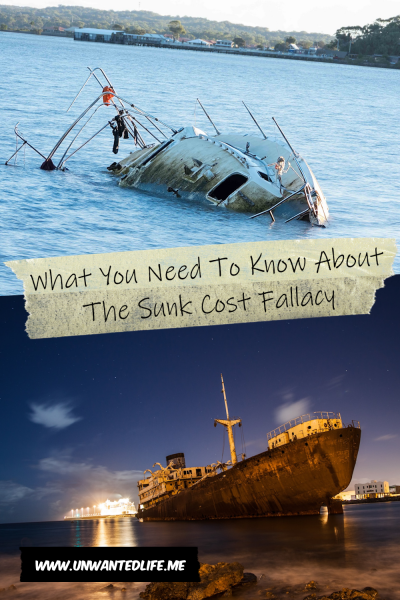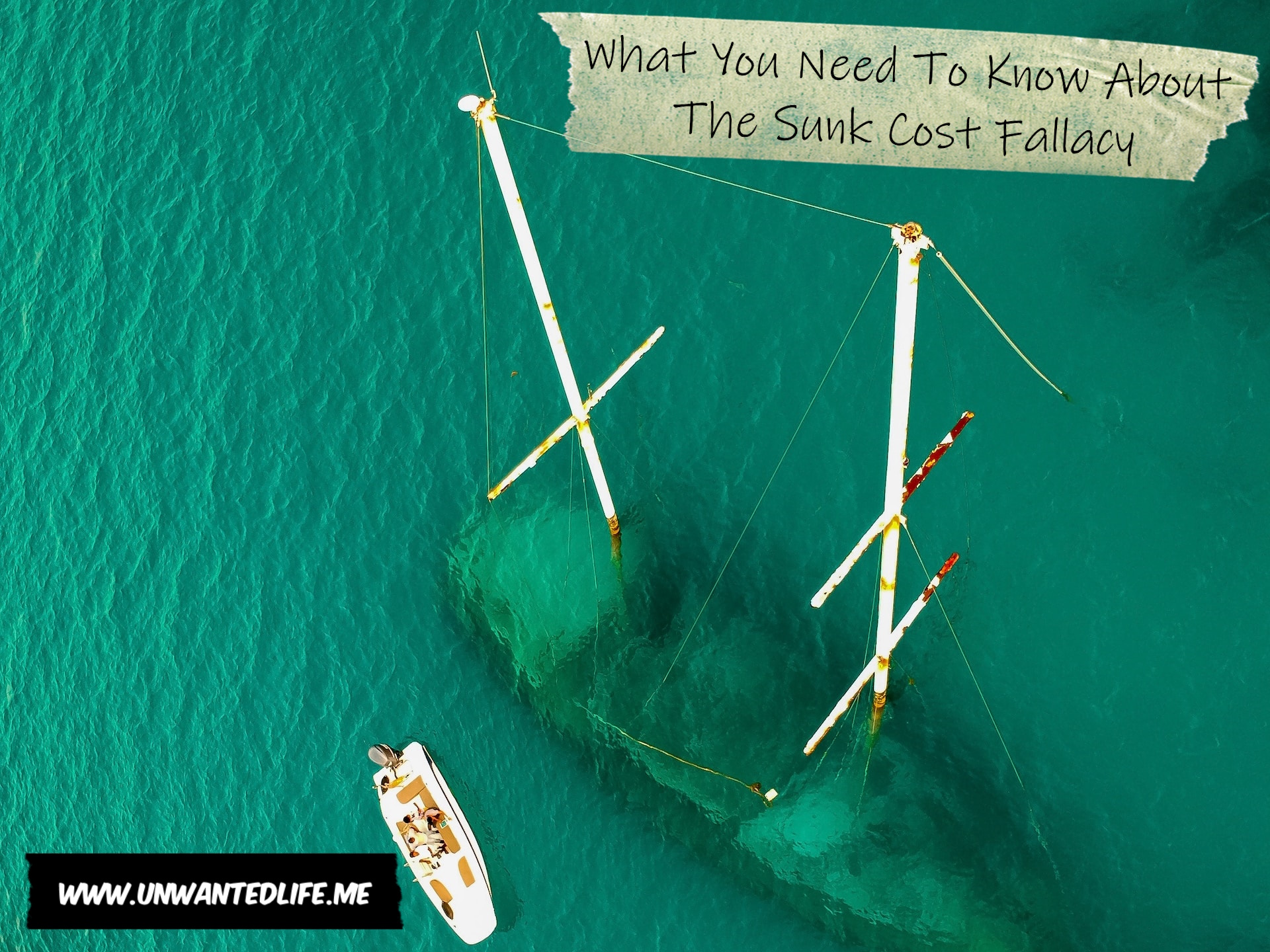Because I’ve worked with substance dependency and mental health, I’ve often seen the sunk cost fallacy play out among the people I’ve been supporting. As such, I wanted to share this with you, my readers, to see if it also resonated with you and how you manage your mental wellbeing.
What Is The Sunk Cost Fallacy?
The sunk-cost effect refers to a situation of continued action and further engagement with an endeavour, such as spending more money on something or investing more time and energy, even when such an undertaking may no longer be a good idea. That doesn’t mean the initial investment might not have been unreasonable, but continuing to do so is (Tykocinski and Ortmann, 2011).
Unfortunately, we often allow our prior investments of time, effort, and money to dictate our current and future behaviours, which could cause adverse psychological health (Jarmolowicz, Bickel, Sofis, Hatz, and Mueller, 2016). This makes the sunk cost fallacy a cognitive bias (thinking error) that can lead people to make irrational decisions based on past investments, even if those investments are no longer relevant, useful, or may even be harmful (Verywell Mind).
Sunk Cost Fallacy In Wellbeing
Addiction
The most obvious link between addiction and the sunk cost fallacy is chasing the high, whether it’s substance use gambling, or gaming. This is one reason people often end up building tolerance to the substances they use because they’re no longer getting the effects they expect or need anymore. Meaning, to get the same effects, they have to keep taking more and more over time with each use.
Because people can develop an addiction as a way to cope with problems they’re facing, albeit unhealthily, it’s easy to keep using such methods because they worked at first. However, the reality is it’s only making things worse in the long run.
Mental health
A study by Jarmolowicz, Bickel, Sofis, Hatz, and Mueller (2016) investigated the link between the sunk cost fallacy and mental health. They hypothesised that depressive symptoms like rumination are positively linked to the sunk cost fallacy thinking error. Basically, the more depressed you are, the more likely you are to engage in the sunk cost fallacy.
The reason this is a problem, according to the study, is because it can affect how long someone might wait to seek support. People who commit the sunk cost fallacy wait longer to seek help because they’ve endured the unpleasant conditions so far, so to them, it matters less if they keep doing so.
This is one of the reasons why making comparisons is such a problem. We often stop ourselves from seeking support because we believe other people have it worse, so we keep suffering in silence.
This is supported by a study by Jarmolowicz, Bickel, Sofis, Hatz, and Mueller (2016). They found that 80% of their 1053 participants who committed the sunk cost fallacy would suffer through health issues and psychological distress for longer. They also found that the same participants scored higher in depression and binge eating than those who didn’t commit the sunk cost fallacy.
Health and disabilities
As Jarmolowicz, Bickel, Sofis, Hatz, and Mueller (2016) study showed, people who find themselves affected by the sunk cost fallacy thinking error are likely to dismiss very real health and mental health concerns.
As someone with several invisible chronic health issues, it’s something I’m very familiar with. You become so used to the issues you’re experiencing that you become less bothered by the potential harms they pose. All because the longer you’ve put up with something, the more likely you are to continue to do so. I have regular chest pains, often quite painful and debilitating. But they’ve been happening for so long, that I don’t even think about going to the hospital or reporting it to my GP.
Domestic abuse
Unfortunately, the sunk cost fallacy thinking error could also be a factor in someone staying within an abusive relationship or family. You’ve invested so much time, effort, and money into these relationships that it’s hard to walk away, especially when you can be left with nothing as a result.
How To Avoid The Sunk Cost Fallacy
We can find ourselves committing the sunk cost fallacy in everyday life situations that can affect our mental wellbeing. Therefore, here are some tips to help you avoid the sunk cost fallacy so you can improve your quality of life.
Identify the sunk costs
Try to recognise the investments you have made, whether it be time, energy, money, or other resources, and acknowledge that they may not be recoverable. This can be done through simple self-reflection or by journaling.
Reframe the decision
Instead of thinking about what you have already invested, focus on the present and future costs and benefits of your decisions. Past investments should rarely be a factor. Ask yourself if the decision you are making is the best one for your current or future situation and goals.
Consider the alternatives
Whether through problem-solving or simply thinking and/or researching other options, it’s important to evaluate other options that are available to you. Then weigh the costs and benefits of each option. If there is a better alternative, don’t be afraid to change course and pursue it. Because doubling down on something you’ve done before, that’s no longer really helping, is going to do more harm than good.

Talk to your support network
Talk to your friends, family, co-workers, doctor, etc. about how you’d like to get an objective perspective on something. Sometimes an outside opinion can help you see things more clearly and avoid the sunk cost fallacy.
Plan ahead
Before investing in something, it can be beneficial to create a plan that outlines your goals, the costs involved, and how you will measure success. Having a clear plan in place can help you avoid making decisions based solely on past investments.
Cut your losses
I know change can be tough, but it’s an important skill to be able to adapt. One way you can flex that skill is to realise that if a previous investment is not paying off or is no longer relevant, then cutting your losses is some main character energy. It may be difficult to let go of something you have invested time and resources into, but it is often the best decision in the long run.
Engage in kindness and practice self-care
Always remember to be kind to yourself. One way to do that is to engage in activities that promote your mental wellbeing, such as exercise, meditation, mindfulness, or spending time with your loved ones. Hobbies help ground us in a sense of purpose, so such activities can help you make clearer decisions and reduce stress levels.
Summary
To avoid the sunk cost fallacy and improve your mental wellbeing, it is important to acknowledge sunk costs. It’s also important to focus on the present and future costs and benefits, consider alternatives, seek support, and practice kindness and self-care. Remember, there is nothing wrong with cutting your losses. Don’t make things worse by doubling and tripling down on bad options.
I hope my article and the tips it contains will help you make more informed decisions and improve your overall mental wellbeing.
As always, leave your feedback in the comments section below. Also, please share your experiences with the sunk cost fallacy or any other thinking error in the comments section below as well. Don’t forget, if you want to stay up-to-date with my blog, then sign up for my newsletter below. Alternatively, get push notifications for new articles by clicking the red bell icon in the bottom right corner.
Lastly, if you’d like to support my blog, you can make a donation of any size below. Until next time, Unwanted Life readers.
References
Jarmolowicz, D. P., Bickel, W. K., Sofis, M. J., Hatz, L. E., & Mueller, E. T. (2016). Sunk costs, psychological symptomology, and help seeking. Springerplus, 5, 1-7. Retrieved from https://link.springer.com/article/10.1186/s40064-016-3402-z.
Tykocinski, O. E., & Ortmann, A. (2011). The lingering effects of our past experiences: The sunk‐cost fallacy and the inaction‐inertia effect. Social and Personality Psychology Compass, 5(9), 653-664. Retrieved from https://doi.org/10.1111/j.1751-9004.2011.00369.x.


I always learn new things from your blog. Keep it up.
Thanks
I didn’t know what that meant so this as so informative. These are some helpful tips to not fall into this and make informed decisions. You are always sharing informative blog posts. Thank you for sharing.
Lauren
Thanks for commenting
I’ve never heard of this before. But I’ve definitely been in this mode in the past! Thanks for sharing.
Same. Thanks for commenting
These are great things to do and definitely helpful. Also, its something to practice over time. Thank you for sharing!
Thanks for commenting
This is the first time I heard of sunk cost fallacy. I believe I used to have this problem when I was a contract civil servant. I need to have a good financial plan after this. Thank you for sharing. I learned something new from this post.
Thanks for commenting
Very interesting. I had not heard of the sunk cost but it makes total sense to me. Thank you. I can recognise patterns in my own choices and life, and this will help me turn those things around. Wishing you well as always.
I hope it helps. We often double down on things to save face or to try and avoid being wrong, but it often just makes it worse. Being able to accept you’ve made a mistake and cutting your losses is an important skill to have
I’ve never heard of this before, but your article is packed full of useful information. Thank you for sharing.
Thanks for commenting